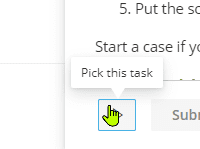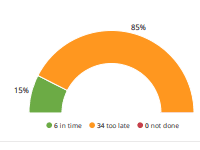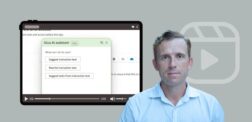
Employee Onboarding Checklist download

Employee onboarding is the process of integrating a new employee into an organisation and its culture. When implemented successfully, new hires find themselves able to perform the new skills, knowledge, attitude and behaviours expected of them quickly and efficiently.
Looking for something else? See these related links:
A handy employee onboarding checklist
Getting onboarding right is important if you want productive employees that stay longer. We’ve been doing some research and have compiled a number of employee onboarding checklists that cover every phase of your onboarding. This article even contains the checklist as an Excel file.
Unfortunately, many organisations fail to execute an onboarding process which gives new recruits the knowledge and inspiration that they need to be loyal, long-term employees. So, what are they missing? The fundamental aspects of onboarding are:
- Have a planned strong, first impression
- Tell your organisations history
- Illustrate your big-picture vision of the future
- Show your organisations values
- Invest in Career Development
Providing all of this information is a complex task, which can take weeks or months. Consequently, we have compiled a complete employee onboarding checklist to help think through each necessary aspect.
If you’re looking for a more comprehensive guide to employee onboarding then take a look at our guide to a successful employee onboarding process.
Effective onboarding is not a one-day event. It is a journey that takes time, patience, and consistent effort to ensure new employees become productive, engaged contributors to the organization.
Sharlyn Lauby

Try Gluu for free
Sign up for a 30-day trial.
No credit card required.
Pre-arrival Employee Onboarding Checklist
1-2 weeks before your new employee’s first day prepare your new hire paperwork. Consider including the following policies and forms for new employees to fill out and sign:
- An Employment Agreement
- A Non-Disclosure Agreement
- An Employee Invention Agreement
- An Employee Handbook
- Tax forms (e.g. IRS form W-4 or IRS form I-9 in the US)
- Bank account details.
Firstly, set up your new employee’s software accounts, including:
- Organisation email
- Office instant messager
- Company Human Resource Information System (HRIS) software
- Business password management software (LastPass, etc.)
- Company productivity software (Gluu, Jira, etc.)
- Company ATS for members of hiring teams
Secondly, prepare your new hire’s tech, including:
- A laptop
- A monitor
- A phone
- A mouse
- A keyboard
- A headset
- In addition, confirm your employee’s new office phone number
- Order business cards and/or a desk nameplate
- Arrange for new employee ID card/building access fob
- Schedule introductory meetings with key colleagues for the new employee’s first few weeks
- Encourage team members (especially those on the interview panel) to reach out to your new hire to congratulate and welcome them prior to their start date. This goes a long way in establishing relationships early in the process
- Also, ask your new employee to fill out an onboarding form, including information about allergies, food preferences and T-shirt size, if you’re including a company shirt in your welcome package
- Make a welcome lunch plan for your new hire’s first day
- Schedule an HR onboarding meeting for your new hire’s first day
- Arrange for parking access, if needed
- Plan your new hire’s first assignment
- Arrange any relevant internal (or external) training required for the job
- Send your new hire a welcome email telling them what to expect
- Include maps, meeting details, etc.
- Make sure they know when to arrive on their first day and ask if they have any more questions
Examples of features for the employee onboarding checklist

Task progress tracking
Let users start and stop tasks to show real-time progress and track value-adding time spent.

Task completion logging
Track if tasks are completed on time, late or not at all using detailed task completion logs.
The day before your new employee’s first day
Clean your new employee’s desk and set up their equipment and welcome kit. Consider including the following in your welcome kit:
- A welcome letter
- New hire paperwork and HR documents
- A company notebook
- Technology setup instructions
- A company T-shirt
- A company mug
- Pens
- A copy of your office map
- A copy of your company org chart
- Stickers
- A copy of your new hire’s first-week schedule
- A copy of a book relevant to your team culture
- Make sure your new hire’s company email account is set up and forward regular team meeting invites to them
- Add your new employee’s email to relevant distribution lists and add their new phone number to relevant phone lists
- Also, send a message to your new hire’s department to remind everyone of their start dates
- Add your new employee’s details to your HRIS system, if you haven’t done so already
- Add your employee’s desk to your office’s internal desk map
The day of arrival:
- Have someone ready to welcome your new hire when they get to the office
- Give your new hire a detailed office tour and make them aware of their schedule for their first few days
- Also, arrange for a welcome meeting with your new hire’s manager to provide an overview of their new team, their role and how their success will be measured
- Schedule time for new hire paperwork
- Take your new hire out for lunch with some of their key team members
- In addition, allow your new hire some downtime to set up their new equipment, set new passwords and log in to their new accounts
- Finally, conduct a formal HR onboarding meeting, including details about benefits enrollment, company holidays and policies, company structure, team culture and review your company’s vision, mission and values. (If you have formally documented them.)
Employee Onboarding Checklist for your new employee’s first week
- Firstly, schedule your new hire’s regular 1:1 management meetings
- Secondly, set clear goal and performance objectives for your new hire’s first 3 months, 6 months and year
- Go over a 3-month roadmap for key projects they will be working on
- Schedule meaningful work tasks that get them up and running
- Provide quick feedback on their initial work tasks and establish management expectations for their performance
- Schedule introductory meetings with each department, not just those the employee will partner but all departments throughout the company so that they can get a full understanding of different parts of your business
- Also, check-in with them on a regular basis and respond to any questions they have
👉 Recommendation: This comprehensive employee onboarding checklist is a valuable resource for organizations looking to enhance their onboarding process. It covers every aspect, from pre-arrival preparations to the employee’s first few months, ensuring a smooth and productive integration for new hires. Download and utilize this checklist to create a positive onboarding experience.
Your new employee’s first 3 months
- Continue to have regular 1:1 meeting
- Hold an informal 30 day check in to address any immediate concerns followed by a 90-day check-in to see how everything is going
- Ask for feedback on your onboarding process so you can improve the process for future new hires
Going through all of these phases of onboarding can be a daunting task. So, we hope that this employee onboarding checklist will be of great help towards improving the integration of your new hires.
Here is the full checklist as an Excel download:
In order to ensure that your employee onboarding process is up to industry standards, it’s essential to refer to authoritative resources and organizations. A valuable resource in this regard is the Society for Human Resource Management (SHRM), a leading organization for HR professionals. SHRM offers a wealth of insights, tools, and best practices in the field of human resource management, including comprehensive guidance on employee onboarding.”
Also, if you’d like a bit more of a hand planning your employee onboarding process, we highly recommend MIT’s Onboarding Planning Tool.
Conclusions
A well-structured employee onboarding process is essential for integrating new hires successfully into an organization. It sets the stage for productivity, engagement, and long-term retention. Following a comprehensive checklist like the one provided can significantly improve the onboarding experience for both employees and employers.

Try Gluu for free
Sign up for a 30-day trial.
No credit card required.
Frequently Asked Questions
Employee onboarding is vital because it helps new hires acclimate to their roles and the company culture quickly. It sets the foundation for long-term employee engagement, productivity, and retention.
The pre-arrival checklist should include documents such as an Employment Agreement, Non-Disclosure Agreement, Employee Invention Agreement, Employee Handbook, tax forms, bank account details, and any relevant company policies or forms.
Organizations can enhance their onboarding process by ensuring a strong first impression, providing information about the company’s history, vision, values, investing in career development, and following a structured onboarding checklist. Regular feedback and adjustments are also essential for continuous improvement.
This post was originally published on September 28, 2018, and revised on October 12, 2022.




